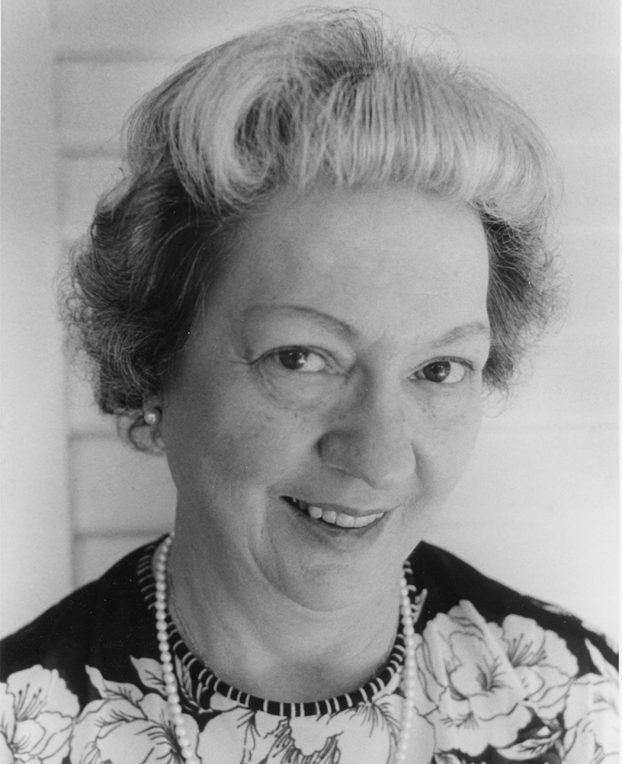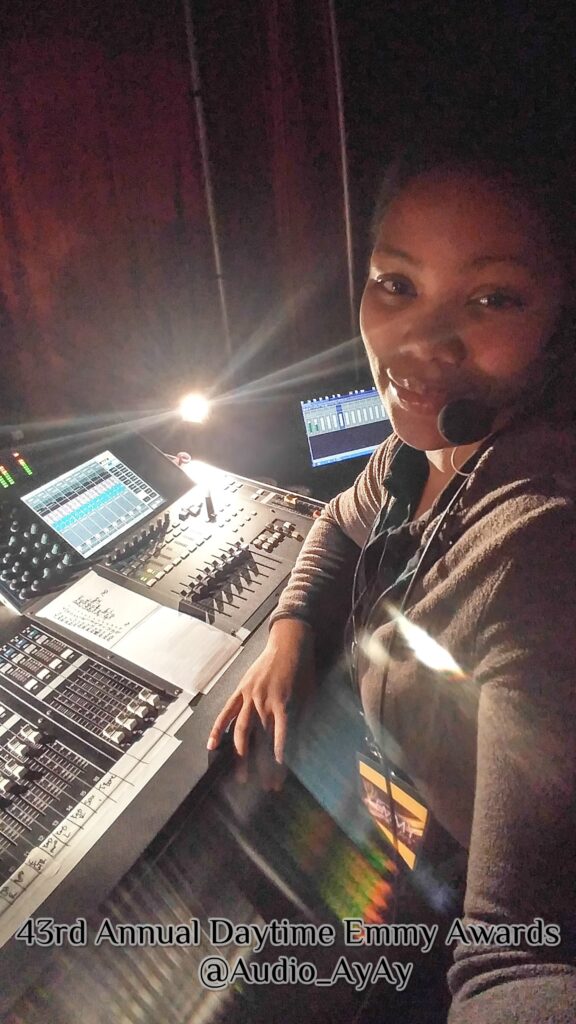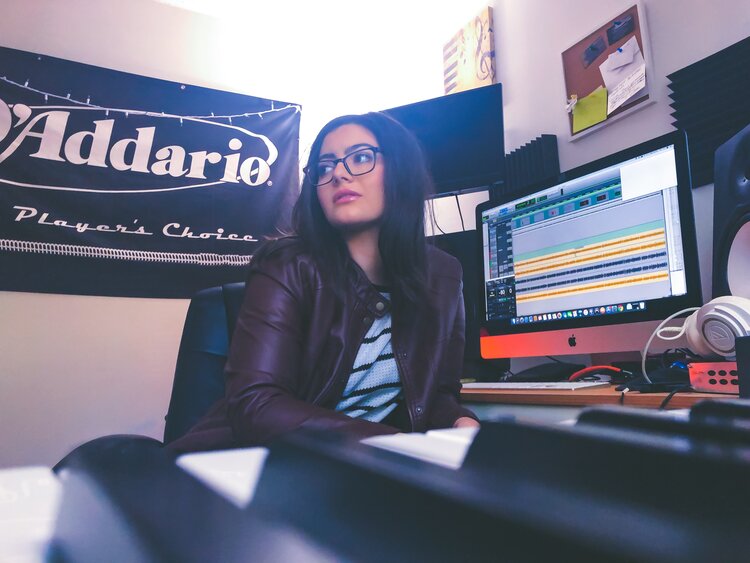 In 1949, Lillian Shedd McMurry heard a record that changed her life. A woman with no prior experience in the music industry started a record store, record label, and recording studio where she produced, promoted, and engineered songs – many of which became rhythm and blues classics. Some of her artists went on to hit records and career success such as Sonny Boy Williamson, Elmore James, and Big Joe Williams. At its peak, Lillian calculated Trumpet Records to be the fifth-largest independent record label in the US.
In 1949, Lillian Shedd McMurry heard a record that changed her life. A woman with no prior experience in the music industry started a record store, record label, and recording studio where she produced, promoted, and engineered songs – many of which became rhythm and blues classics. Some of her artists went on to hit records and career success such as Sonny Boy Williamson, Elmore James, and Big Joe Williams. At its peak, Lillian calculated Trumpet Records to be the fifth-largest independent record label in the US.
She was born Lillian Shedd in 1921 in Purvis, Mississippi. During the Great Depression, Lillian’s family experienced extreme poverty. For years, they couldn’t afford a radio, so the family entertained themselves by singing together. She had seven male cousins who were like brothers to her. Lillian, a self-described tomboy, could “whip any three” of her cousins.
At age 13, she worked part-time after school. She graduated high school with experience in bookkeeping and secretarial work. In the early 1940s, she worked the counter at a pharmacy from 7 am to 10 pm 7 days a week, and was later promoted to manager. She met her future husband, Willard McMurray when she inquired about a beautiful concert grand piano for sale in his furniture store. The two were married in 1945 and had a daughter, Kathryn Vitrice, in 1947.
Willard and Lillian purchased a hardware store in 1949 (at 309 Farish Street in Jackson, Mississippi) with the plan to turn it into a furniture outlet. It was located on the boundary of white and black businesses and entertainment districts. While sorting through what was left behind in the building, workers came across a stack of unsold 78s (at the time, you could find records for sale at hardware stores in addition to grocery stores, service stations, and beauty parlors). One of the workers put on a record, Wynonie Harris’s recording of “All She Wants to Do Is Rock,” and Lillian was transfixed. “’It was the most unusual, sincere and solid sound I’d ever heard,” she said. ”I’d never heard a black record before. I’d never heard anything with such rhythm and freedom.’”
The workers (one who was a part-time bassist) knew these “race” records could only be ordered from wholesale houses in New Orleans. Lillian was going there on business soon and asked them to help make up a list of records to buy. In New Orleans, some of the distributors laughed at Lillian’s lack of knowledge but still told her where to get the records. She asked Willard if they could turn the store into a combination record and furniture store and he agreed.
Record Mart
The store had a sign that said Record Mart and the record shelves were on the walls (the center of the store had furniture for sale). She quickly sold out of her new records and the stock the workers had found. Lillian advertised three hours a day on a local radio show that featured a lot of music aimed at the black audience (R&B, blues, and gospel music). Lillian then expanded to the mail-order business, growing to as many as 1,500 orders a day. Most of the orders were coming from rural areas which had no record shops.
Record Mart also had listening booths which brought customers to the store to listen to new releases. Vocal groups would come in to hear new releases and sing along. This was the first time Lillian heard a live black vocal performance. Marc Ryan says in his book, “Trumpet Records: An Illustrated History with Discography”:
In the segregated society of Mississippi, it had been possible for Lillian McMurry to live nearly thirty years without having heard live or recorded black music. Segregation worked both ways, and the places where black musical forms flourished were pretty much off limits for whites.
Trumpet Records
The success of record sales at the store and her encounters with local musicians made Lillian want to create her own records. 28-year-old Lillian formed Trumpet Records and its parent company, The Diamond Record Company (DRC). Her first two signed artists were black gospel groups she met in the store (over time, word traveled that Lillian would audition walk-in talent at Record Mart). On April 3, 1950, Lillian produced her first recording session with a local group called the St. Andres Gospelaires. The session was at a local radio studio (WRBC). Lillian signed a second artist, the Southern Suns, to an exclusive contract on May 30, 1950, and had their first recording session at WRBC the next night.
Even with her lack of experience, Lillian already had the instinct of a producer. She went looking for local country, western, and blues artists to expand the label. While she didn’t have any marketing data to know it would sell, she saw how Hank Williams’ records performed at Record Mart (she had never heard of Hank Williams until the prior year when her workers wrote up the list of records for her to buy). Lillian arranged for a recording with Kay Kellum, a well-known local singer-accordionist, and paired him with two brothers she heard on the radio (Sam and Westley Tolars who played bass and fiddle).

Sonny Boy Williamson II
Lillian heard about a blues singer who played the harmonica (or the “harp” as it’s known in the blues circle) and tracked him down in a neighboring community. Sonny Boy Williamson had been performing locally and on the radio for almost 20 years. They signed a contract in December 1950 and in January they recorded the label’s first hit, “Eyesight to the Blind.” The recording was at Ivan Scott’s Radio Service Studio in Jackson. He used one microphone and a direct-to-disc recording process.
It turns out Sonny was not the artist’s real name – he was an escaped convict who needed a new name. Sonny recorded hits for the label including “Dust My Broom” and became one of Trumpet’s most successful artists.
In 1951, the label got the news that all of their masters, which had been sent to the Master Record Company in Chicago, were lost in a fire. Lillian powered forward by finding a new firm to handle her mastering and getting her artists back in the studio to re-record songs.
Lillian had high standards in the studio. She recalled 120 rejected takes on one title. Since Ivan Scott’s studio was direct-to-disc, they couldn’t edit, and a new disc was required for each take. Whether it was a balance issue, audio problem, or an artist’s flaw in performance, Lillian only wanted to release the best.
Lillian was honest and direct with her artists. In a later letter to Joseph Curtis Almond (after he skipped a session), she said, “We are very disappointed with your slow tunes . . . Your voice is cracked all through; you blast and then drop your voice, and the whole dark vocal comes out a mess. . . If you had come to Jackson as planned on Thursday, we could have put you on the mike and corrected anything that was wrong with the songs or your voice; then you could have rehearsed from Thursday until Sunday.” She told Sherman “Blues” Johnson in a letter, “You are about the nicest guy, and we do appreciate your attitude. .We are not discouraged, and we don’t want you to be. . . I’m going to give you a swift kick in the pants next time I see you if you don’t keep on trying.”
Recording to Tape
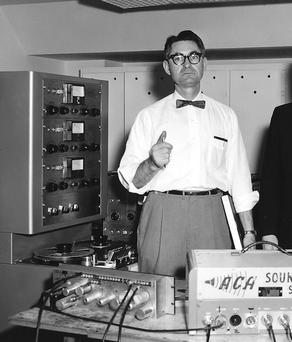
Bill Holford, ACA Studios
A year into operations, Lillian discovered Bill Holford, a recording engineer who owned the Audio Company of America (ACA) in Houston. Bill was willing to work remotely and worked with analog tape (new technology at the time) which gave the ability to edit takes. Bill was an Oklahoma native who trained in the Air Force (where he learned electronics) during World War II. He had a 1948 Raytheon four-channel mixer and an Ampex 300 mono recorder. Lillian booked him in December 1951 for a marathon series of sessions (four days, three nights) and scheduled nearly all of her contracted talent. The sessions were booked at the local Musicians’ Union Hall.
With Bill busy setting up mics and Lillian doing last-minute preparations, they didn’t notice what was going on with the union folks at the hall. At the time, Mississippi was one of the most openly segregated areas of the entire country, and the musician’s union had a ‘whites only’ policy. According to Marc Ryan, “Lillian had naively assumed that the union would welcome such a flurry of activity for the Jackson musicians. As a relative novice in the recording field, she had little knowledge about the attitudes and policies of the rank-and-file white leadership towards black musicians. When the union bosses finally sized up the situation, turmoil erupted.”
Lillian and Bill captured a few tracks while the union bosses bothered the black musicians waiting to record. “I wasn’t going to have those musicians harassed,” she said in Ryan’s book. “They got so nasty that we just moved our equipment out.” She quickly located a vacant club hall, the Cedars of Lebanon, and rented it for the rest of the sessions. Ryan wrote, “Beset with coffee nerves and talking herself hoarse; the crusading producer forged on into the third night, then the fourth day, of the marathon. Holford, ever calm and self-possessed, aided and comforted by his wife Kay, kept the reels of his Ampex rolling as the final round of recordings built to a remarkable climax.” In the end, they had 42 usable takes and Lillian was confident there were hits in the bunch.
Lawsuit
In January 1952, Lillian received news that “a pair of big shots from Hollywood” were in the Jackson area trying to sign artists by promising fame and fortune. Many of the artists the Bihari brothers (Jules and Joe) were going after were Trumpet artists – with no regard to their Trumpet contacts. Lillian quickly contacted a lawyer and the local Sheriff. The Sheriff issuing a restraining order to the Bihari brothers during a demo recording at a local nightclub. Trumpet artist Lonnie Holmes was about to audition when the Sheriff came in. The session ended, and the Biharis were served papers to appear in court. Diamond Record Company was suing Modern Records for “inducing artists who were under exclusive contract” and asking $1 million in damages.
The lawsuit made national news and the case was in the courts for over two years. In 1954, a judge ruled in Lillian’s favor. The Biharis were guilty of “violating a state statute forbidding willful and knowing interference between parties of an employment contract.” The damages awarded were a disappointing $2,500 and the Biharis continued to record with one of the artists they took from Lillian, “Mister” Elmore James. Lonnie Holmes, the artist whose audition, was stopped, had his contract voided and his first Trumpet release (which was about to ship) was canceled. He never recorded again.
Moving Ahead
Lillian continued to look for new talent and sign new artists. The Southern Sons recorded some tracks with the Argo Singers, an all-female gospel group based in Chicago.
Their first session was at the RCA Victor Studio in Chicago then one at Universal Recording (while Bill Putnam was still based in Chicago). Lillian held Gospel concerts at some of Jackson’s small theaters and used that to help promote the label and the store. These shows were advertised on local radio and usually had a full house.
On the country music side, Lillian was gaining recognition for her ear for artists. Producers from MGM and Capitol started to call her to talk shop and market trends. After Hank Williams’ death in 1953, she recognized a hole in the market and arranged sessions with existing and new Trumpet artists. She helped shape part of the early Rockabilly sound with artist Joseph Curtis Almond.
She hired top musicians for some recordings including B.B. King, Little Milton Campbell, and Joe Willie Wilkins. Even though the city of Jackson’s musician’s union had segregation requirements, she refused to adhere and mixed black and white musicians. Lillian said later, “Because we recorded some black blues and spirituals, I was treated rather ugly sometimes by certain people… I acted like a lady, as a businessperson, and that’s the way it should have been.”
Lillian’s devotion to her artists went outside the studio, too. She offered everything from encouragement and advice to money management and cab rides. She got notified by the police that artist Bobo “Catfish Slim” Thomas had been in jail for eight months. The year prior, Lillian had loaned him an amp and a guitar to write a b-side to a song, and he hadn’t been heard from since. Lillian wasn’t concerned about the broken and muddy guitar and amp the police were returning to her. She was more concerned that Bobo didn’t have a single hearing in eight months. She hired a lawyer for him for $125 (for perspective, a 125-mile taxi ride would cost you $6 at the time). Lillian was at the trial where she spent two hours in a room behind the judge’s bench trying to talk Bobo into pleading “not guilty” so the judge would let him go. A couple of years later, Lillian sent her family doctor to check on Trumpet artist Willie Love as his health was failing. She visited Willie in the hospital in his final days, and DRC paid for his funeral.
Recording Studios
Lillian tried a few tape-based studios once she made the jump from recording vinyl. She connected with Sam Phillips, engineer, and owner of Memphis Recording Service (where Marion Keisker worked). Lillian knew that Sam’s interest was the blues and trusted his instinct and sent some of her artists for sessions at his studio. She also continued to send artists to ACA in Houston. But, eventually, a new idea came about: The furniture store. In the summer of 1953, Lillian’s dad built the Diamond Recording Studio (designed by Bill Holford of ACA) in the 309 building. The Record Mart ceased operations.
Ryan’s book explains her gear:
She bought a new Macintosh pre-amp and amplifier, a big Altec Lansing monitor, RCA 77 DX and 44 BX microphones, and a Magnecord tape deck. She had mattresses hung on the walls and ceiling, covering them with huge theatre drapes for acoustical effect.
Lillian began experimenting as an engineer, using her observations from being in sessions with engineers like Holford and others. Ryan said,
She discovered the wisdom in recording everything “flat”, with no “echo”, which could then be added later as needed. She studied balance, striving always to keep the voice “out front.” With her usual dynamism, she soon was obtaining professional standards in her temporary studio in the furniture store. The first DRC studio session to be released on the Trumpet label was Jerry McCain in October 1953.
Lillian engineered tracks at the studio such as Sonny Boy Williamson’s “Red Hot Kisses” and ‘Lucky’ Joe Almond’s “Every Day of the Week.” Most (but not all) of DRC’s catalog starting DRC 185 were recorded by Lillian.
The End of Trumpet
By the end of 1954, the DRC was losing money, and Lillian’s enthusiasm was starting to dwindle. Willard’s furniture business was subsidizing the studio in hopes a new release would be a big success and help put the studio and label finances back on track. It had been nearly two years since Trumpet had a big hit. The label faced a number of struggles – unfaithful artists, the failure to find new artists that could grab hold of the market, distributors that took merchandise on advance then went bankrupt, and other distributors that ignored invoices completely.
At the same time, R&B music was starting to reach the mainstream. The major labels were enveloped by it. It wasn’t practical for Lillian to release music for local consumption but competing with the majors was going to be a challenge. Lillian, in a fight to the end, started Globe Records in an attempt to reach a new market (she also engineered all the recordings, as well).
Trumpet was done (in 1955). But, the growing debt of the organization lead to fewer recording sessions. Lillian even traded away Sonny Boy’s recording contract to their pressing plant, Plastic Products, to cancel a huge debt. The last recording was Lucky Joe Almond on St. Patrick’s Day in 1956.
Ryan says in his book, Lillian “had grown from a musically naive dilettante to an accomplished professional, whose tiny label had blossomed to become, for a few years at least, the second-largest independent label based in the South. To have remained in the field into the second half of the decade would have required a greater stake than the McMurrys were willing to gamble. The furniture business was still booming, and there was certainly no need to pursue the chimerical forms of fame and fortune that tantalized so many of DRC’s contemporaries.”
Lillian continued to keep the books and sell off old record stock for years at the furniture stores. She kept Globe Music, the publishing company where most of Trumpet’s catalog (and some unreleased tracks) went. She kept protecting her business-like in 1963 when a record-producer reissued some of Sonny Boy’s Trumpet recordings without Lillian’s blessing (she immediately sued the label owner). Federal copyright did not protect sound recordings until 1972. She protected her artists, too, who she diligently paid royalties on-time for years.
The rights to many Globe and Trumpet releases were sold to other labels (major and small). In 1985, the remaining masters and rights were donated to the Centre for the Study of Southern Culture (at the University of Mississippi in Oxford).
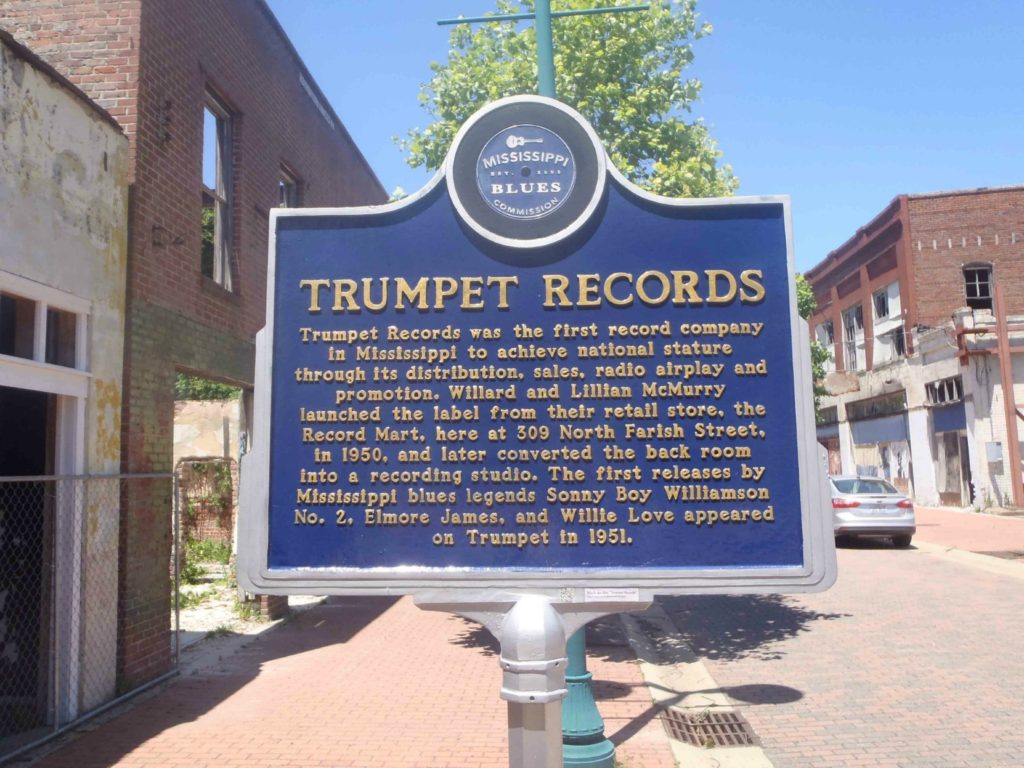 Lillian was inducted into the Blues Hall of Fame in 1998 (one of a few record producers at the time to have that honor). She died a year later at age 77.
Lillian was inducted into the Blues Hall of Fame in 1998 (one of a few record producers at the time to have that honor). She died a year later at age 77.
In 2007, Lillian and Willard McMurry were posthumously honored with a historical marker at 309 Farish Street in Jackson. It was the first record company in Mississippi to achieve this type of recognition. Unfortunately, the site of the studio has since decayed – but Lillian’s most important contribution to the music industry will live on.
Further reading/listening
Ryan, Marc. Trumpet Records: an Illustrated History, with Discography. Big Nickel Publications, 1992.
Lillian McMurry and the Blues Contracts of Trumpet Records
